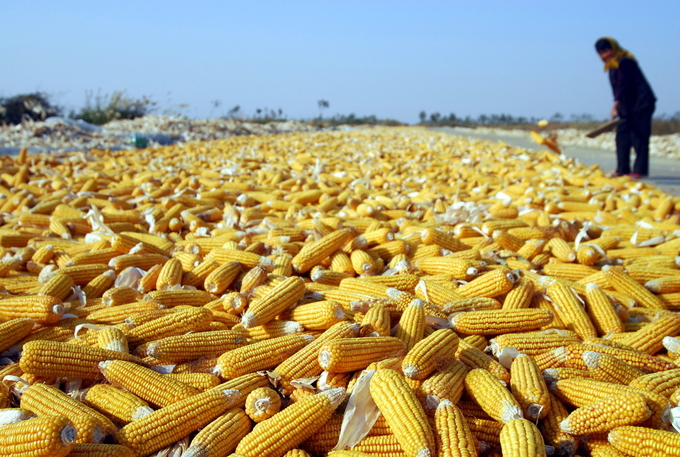June 17, 2025 | 06:47 GMT +7
June 17, 2025 | 06:47 GMT +7
Hotline: 0913.378.918
June 17, 2025 | 06:47 GMT +7
Hotline: 0913.378.918

A Chinese farmer dries corns on the outskirts of Qingdao city, Shandong Province. Photo: Oriental Image via Reuters Connect.
The Ministry of Agriculture and Rural Affairs awarded safety certificates to the 17 crop varieties, according to a document on its website on Tuesday.
The approved gene-edited crops include two soybean varieties, and one each of wheat, corn, and rice.
The approved varieties include seeds from Beijing-based feed group Dabeinong (002385.SZ), opens new tab and China National Seed Group, a subsidiary of seeds and pesticides maker Syngenta Group.
Unlike genetic modification, which involves inserting foreign genes into a plant, gene editing alters existing genes to enhance or improve the plant’s traits. Some scientists view gene editing as less risky than genetic modification.
China has also authorised the import of an insect-resistant and herbicide-tolerant GM soybean variety from the German chemicals firm BASF exclusively as a processing material, the ministry added.
Over the past year, the country has increased approvals for higher-yielding GM corn and soybean seeds to raise domestic production and reduce grain imports.
China mostly imports GM crops such as corn and soybeans for animal feed, while cultivating non-GM varieties for food consumption. Many Chinese consumers remain concerned about the safety of GM food crops.
The safety certificates for the newly-approved varieties are valid for five years, starting from December 25, according to the ministry document.
Reuters

(VAN) The working delegation from the Ministry of Agriculture and Environment conducted an important trip to the Netherlands to strengthen strategic partnerships and sustainable development in the agricultural sector.

(VAN) The letter ‘A Plea from the Ocean’ not only evokes emotion but also awakens the human conscience to the responsibility of protecting life on Earth.

(VAN) The Department of Agriculture in South Africa has announced the country’s first mass vaccination of poultry to prevent local birds from contracting avian influenza.

(VAN) Establishment of the Mekong Delta Regional Agricultural Linkage Center, aiming for a closed value chain, deep processing, trading platforms, and international market connectivity.

(VAN) Gia Lai province has recently recorded 460 rare species of animals and plants, contributing to forest conservation and biodiversity planning in the region.

(VAN) Ms. Caroline Beresford, New Zealand Ambassador to Vietnam, expressed confidence that agricultural cooperation between Vietnam and New Zealand will develop sustainably, be climate-resilient, and promote gender equality.

(VAN) Vietnam reaffirms its commitment to international cooperation in fostering sustainable and responsible fisheries while ensuring resilient livelihoods for small-scale fishing communities.